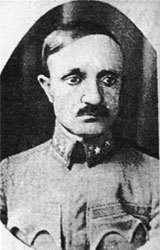
Ismail Qemali, was an Albanian politician and statesman who is regarded as the founder of modern Albania. He served as the first prime minister of Albania from December 1912 until his resignation in January 1914.

Isa Boletini was an Albanian revolutionary commander and politician and rilindas from Kosovo.
Dobi is a family name (surname) originating in Hungary. It is mostly prevalent in Hungary, Albania, Serbia and the United States.

In 1997, widespread civil unrest struck Albania due to economic problems in the country that were caused by the collapse of pyramid schemes. Due to the large quantities of money robbed from the government to fund the schemes, the Democratic Party's government collapsed in January 1997. More than 2,000 people were killed in the conflict until its end in August 1997. The creation of a new government came as the revolutionaries surrounded Tirana. Various other sources also describe the violence that ensued as a rebellion or even a civil war.

The Principality of Albania was a short-lived monarchy in Albania, headed by Wilhelm, Prince of Albania, that lasted from the Treaty of London of 1913 which ended the First Balkan War, through the invasions of Albania during World War I and the subsequent disputes over Albanian independence during the Paris Peace Conference of 1919, until 1925, when the monarchy was abolished and the Albanian Republic declared.

The Albanian Declaration of Independence was the declaration of independence of Albania from the Ottoman Empire. Independent Albania was proclaimed in Vlorë on 28 November 1912. Six days later the Assembly of Vlorë formed the first Government of Albania which was led by Ismail Kemal and the Council of Elders (Pleqnia).
Xhemal Deliallisi was a prominent figure of the 19th century in the Shijak area of Albania. He was one of 40 signatories of the Albanian Declaration of Independence alongside his cousin Ymer Deliallisi. His tribe was one of the most influential in the area of central Albania where is his father, Sali bey Deliallisi, is thought to have been the founder of the modern city of Shijak.
Riza Kryeziu (1847-1917), known as Riza Bey Gjakova, was an Albanian nationalist figure and guerrilla fighter, an influential bey in the Gjakova region, then part of the Vilayet of Kosovo, Ottoman Empire, and one of the activists of Albanian national movements of early 20th century.
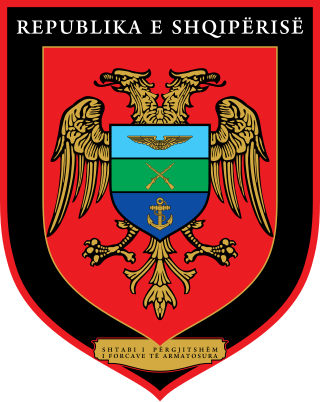
The General Staff of the Armed Forces, is the highest military structure of the Albanian Armed Forces. It was established as a joint strategic staff and functions according to NATO standards. The incumbent Chief of the General Staff is Major General Arben Kingji.

Fehim bey Zavalani (1859-1935) was an Albanian landowner from the Kolonjë area, journalist and activist of the Albanian National Awakening. He was also the editor of Bashkimi i Kombit, one of the most important Albanian newspapers of the era. In 1908 he became one of the head organizers of the Congress of Monastir, in which the Albanian alphabet was standardized.
The Uprising of Dervish Cara was a 19th-century uprising in northern Ottoman Albania directed against the Ottoman Tanzimat reforms which started in 1839 and were gradually being put in action in the regions of Albania. Some historians include the actions in Dibër of the same time under the same historical name, though the events in Dibër were independent and headed by other leaders.
The Albanian revolts of 1833–1839 took place in Albania as a reaction against the new centralizing policy of Ottoman administration.

The All-Albanian Congress was a held in Vlorë on November 28, 1912. Congress participants constituted the Assembly of Vlorë which established Albanian Provisional Government and elected Ismail Kemal as its president.
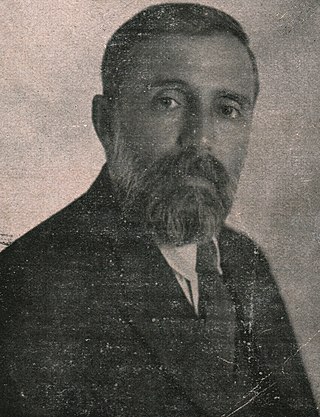
Kadri Prishtina (1878–1925), better known as Hoxha Kadri, was an Albanian political figure of the early 1920s.
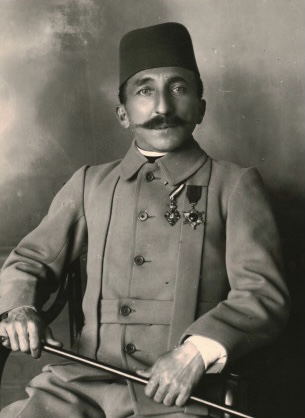
Hysni Curri (?–1925) was a Kosovar Albanian military figure and a prominent leader of the Kachak movement and the Committee for the National Defence of Kosovo.

Aqif Pasha Biçaku mostly known as Aqif Pashë Elbasani was an Ottoman Albanian political figure in the Sanjak of Elbasan and after the Young Turk Revolution became an activist for the Albanian national cause.

Kristo Floqi was an Albanian patriot, playwright, politician, and lawyer.
The Second Congress of Manastir was an Albanian congress held on 2–3 April 1910 in Manastir, back then Ottoman Empire, today's Bitola in the Republic of North Macedonia. It dealt with the challenges that the Albanian language and schools faced at the time within the context of the empire, and the platform to overcome them.
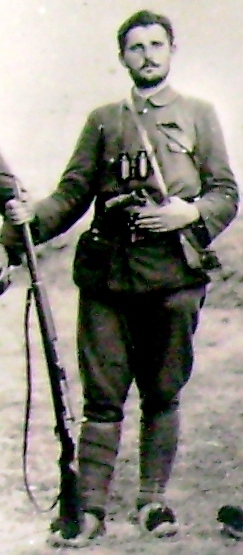
Menduh Zavalani (1889–1914) was an Albanian revolutionary and political leader active during the last years of the Albanian National Awakening. He formed his own revolutionary band and was one of the leaders that liberated Përmet and the environs from the Ottoman Empire. Menduh was an appointed delegate from his hometown Korça to the Albanian National Congress that proclaimed the Independence of Albania. In the intellectual level Menduh was noted for the translation of Friedrich Schiller's drama Wilhelm Tell into Albanian. He was assassinated at a very young age near Pogradec by a local collaborationist band.
The Taksim meeting alternatively known as the Taksim Plot and less commonly as the Taksim Assembly was a secret meeting held in January 1912 by Albanian nationalist deputies of the Ottoman parliament and other prominent Albanian political figures. The event gets its name from Taksim Square because of the location of the house where it was held. The meeting was organized on the initiative of Hasan Prishtina and Ismail Qemali, Albanian politicians, who invited most of the MPs of Albanian origin and aimed at launching an armed general uprising in Albanian territories against the central government headed by the Committee of Union and Progress (CUP). The meeting followed two other Albanian uprisings of 1910 in the Vilayet of Kosovo and 1911 in the mountains of upper Shkodra. The Taksim meeting resulted in an uprising the same year, with armed uprisings in Shkodër, Lezhë, Mirditë, Krujë and other Albanian provinces, which exceeded the organizers' expectations. The biggest uprising was in Kosovo, where the rebels were more organized and managed to take over important cities like Prizren, Peja, Gjakova, Mitrovica and others.
